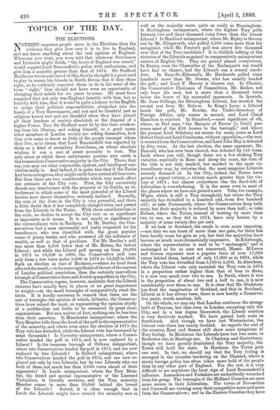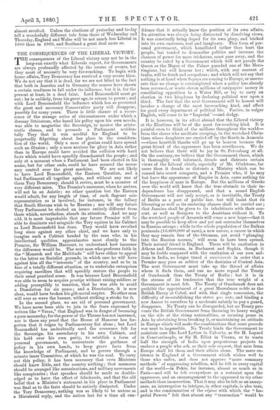TOPICS OF THE DAY.
THE ELECTIONS.
OTHING surprises people more in the Elections than the 1.1 evidence they give how easy it is to live in England, and not know anything about the real opinion of England. Wherever you went, you were told that whatever Scotchmen and Irishmen might think, "the heart of England was sound," would support Lord Beaconsfield's policy with enthusiasm, and give him a majority greater than that of 1874. Sir Stafford Northcote was so convinced of this, that he thought it a good card to play to assure his friends in North Devon that if they chose right, as he evidently expected them to do in his sense of the term "right," they should not have even an opportunity of changing their minds for six years to come. He must have supposed that not only was England heartily with him, but so heartily with him, that it would be quite a luxury to the English to resign their political responsibilities altogether into the hands of a Tory Government, and rest and be thankful just as religious hearts rest and are thankful when they have placed all their burdens of anxiety absolutely at the disposal of a higher Power. Poor Sir Stafford must be by this time awaken- ing from his illusion, and asking himself, as a good many other members of London society are asking themselves, how they ever came to know so little of the people amongst whom they live, as to dream that Lord Beaconsfield was regarded by them as a kind of secondary Providence, on whose absolute wisdom it was a sort of sweet necessity to lean. The only straw at which these unfortunate persons now catch is the tremendous Conservative majority in the City. There, they say, you may see what responsible, opulent, and intelligent con- viction really is. And indeed, it is quite true that if the Tories had been courageous, they might easily have carried all four seats. But then there are two considerations which very much affect our estimate of the City vote. First, the City excessively dreads any interference with the property of its Guilds, an in- terference to which some of the most powerful of the Liberal leaders have shown themselves seriously inclined. Secondly, the vote of the Jews in the City is very powerful, and there is little doubt that it has completely changed sides, and passed from the Liberals to the Tories. With these considerations in the scale, we decline to accept the City vote as so significant or impressive as it seems. It is not nearly so significant as the extraordinary vote in Hackney. In Mr. Bartley, the Con- servatives had a man universally and justly respected for his beneficence, who was identified with the great popular cause of penny banks, and who possessed all the influence of wealth, as well as that of goodness. Yet Mr. Bartley's poll was more than 6,600 below that of Mr. Holms, the lowest Liberal ; and while the Liberal poll sprang up from 10,900 in 1874 to 18,300 in 1880, the Conservative poll rose only from a few votes under 9,000 in 1874 to 10,322 in 1880. Such an election as that of Hackney,—where no local fears affected the result,—is far more significant of the set of the current of London political conviction, than the certainly marvellous triumph of Conservative fears and Jewish sympathies in the City. The Conservative organs, however, maintain that the Liberal victories have usually been in places of no great importance or weight, —in the small boroughs of comparatively rural dis- tricts. It is hardly necessary to remark that these are the sort of boroughs the opinion of which, hitherto, the Conserva- tives have valued the most, as representing the opinion chiefly of a middle-class not liable to be overawed by great class- organisations. But as a matter of fact, nothing can be less true than their assertion. Is Manchester unimportant, where the Tory Member falls from the head of the poll to the representative of the minority, and where even since the election of 1875 the Tory vote has dwindled, while the Liberal vote has increased by some thousands ? Is Coventry unimportant, where a Conser- vative headed the poll in 1874, and is now replaced by a Liberal ? Is the immense borough of Oldham unimportant, where two Conservatives headed the poll in 1874, and are now replaced by two Liberals ? Is Salford unimportant, where two Conservatives headed the poll in 1874, and are now re- placed not only by two Liberals, but by two Liberals who are both of them not much less than 3,000 votes ahead of their opponents ? Is Leeds unimportant, where the Tory Mem- ber, the friend and special representative of the Licensed Victuallers, is literally nowhere, and the Tory minority Member comes in more than 10,000 behind the lowest of the Liberals ? Indeed, it is clear enough that in Leeds the Liberals might have carried the minority seat as well as the majority seats, quite as easily as Birmingham. Is Nottingham unimportant, where the highest Tory polls between two and three thousand votes fewer than the lowest Liberal ? Is Bradford unimportant, where Mr. Ripley is thrown out by Mr. Illingworth, who polled 3,900 votes more than his antagonist, while Mr. Forster's poll was above five thousand over that of the Tory candidate ? It is childish talking of the victories of the Liberals as gained in comparatively unimportant centres of English life. They are gained almost everywhere. In Exeter, even the Chancellor of the Exchequer's son would have had no chance, had the Liberals run a second candi- date. In Bury-St.-Edmund's, Mr. Hardcastle polled some hundreds more than Mr. Greene, who has usually headed the poll ; and Lord F. Hervey is thrown out. In Chester, the Conservative Chairman of Committees, Mr. Raikes, not only loses his seat, but is more than a thousand votes below the lower of his successful opponents. In Ipswich, Mr. Jesse Collings, the Birmingham Liberal, has wrested the second seat from Mr. Bulwer. In King's Lynn, a Liberal heads the poll, Mr. Bourke, the Under-Secretary of Foreign Affairs, only comes in second, and Lord Claud Hamilton is rejected. In Stamford,—most significant of all, where, as Dod says, "the Marquis of Exeter [a Cecil] pos- sesses most of the £10 houses in the borough," and where the present Lord Salisbury sat secure for many years as Lord Robert Cecil and Lord Cranborne, without opposition,—the seat is wrested from the Conservatives, and Lord John Hay is defeated by fifty votes. At the last election, the same opponent, Mr. Buszard, who has now been elected, was defeated by 146 votes. Look where you will, though there are a few striking Tory victories, especially in Kent and along the coast, the turn of the tide is not only marked, but marked in the most ex- traordinary way, by victories that the most sanguine Liberals scarcely dreamed of. In the City, indeed, the Tories have gained a signal victory, a victory much greater than the vic- tory of 1874; but almost everywhere else the flood-tide of Liberalism is overwhelming. It is the same even in most of the places where we have not gained a seat. Take, for example, Wigan, which is still a Tory stronghold, but where the Tory majority has dwindled to a hundred odd, from five hundred odd ; or take Portsmouth, where the Conservatives keep both seats, but their majority is reduced by more than half ; or take Belfast, where the Tories, instead of beating by more than two to one, as they did in 1874, have only beaten by a majority of some twenty-five per cent.
If we look to Scotland, the result is even more imposing, —not that we can boast of more than one gain, for there has been hardly room for gain as yet, but that the majorities have become so much more dramatically impressive. In Edinburgh, where the representation is said to be "unchanged," and is unchanged so far as men are concerned, Messrs. M‘Laren and Cowan represent now a popular force of over 17,000 voters behind them, instead of only 11,000 as in 1874, while the Tory vote has dwindled from 5,700 to 5,600. In Aberdeen, where the Liberal vote only exceeded the Tory vote in 1874 in a proportion rather higher than that of four to three, it is now very much over two to one. In Perth, where it was in the proportion of about two and a half to one, it is now considerably over three to one. It is clear that Mr. Gladstone has fired the imagination of Scotland, and that in Scotland, Liberal as it has always been, there is now hardly a Conserva- tive party, worth mention, left.
On the whole, we may say that London continues the strong- hold of Toryism, but that even in London, excepting only the City, and in a less degree Greenwich, the Liberal reaction is very decisively marked. We have gained both seats in Southwark. And though we have lost Westminster, the Liberal vote there has nearly doubled. As regards the rest of the country, Kent and Sussex still show some symptoms of Tory feeling. In Maidstone the Liberals have lost two seats, in Rochester one, in Hastings one. In Chatham and Canterbury, though we have greatly diminished the Tory majority, the Tories still hold the seats. In Horsham, the Tories gain one seat. In fact, we should say that the Tory feeling is strongest in the counties bordering on the Channel, where a showy foreign policy has often taken more hold of the people than in any other part of England. For the rest, it is very difficult to see anywhere the least sign of Lord Beaconsfield's influence. Lancashire and Yorkshire are undoubtedly wrenched from his grasp. The boroughs of the Midland Counties are once more secure in their Liberalism. The towns of Devonshire and Cornwall are turning away their sympathies more and more from the Conservatives ; and in the Eastern Counties they have
almost revolted. Unless the elections of yesterday and to-day tell a wonderfully different tale from those of Wednesday and Thursday, England and Wales will be not much less Liberal in 1880 than in 1869, and Scotland a great deal more so.



































 Previous page
Previous page